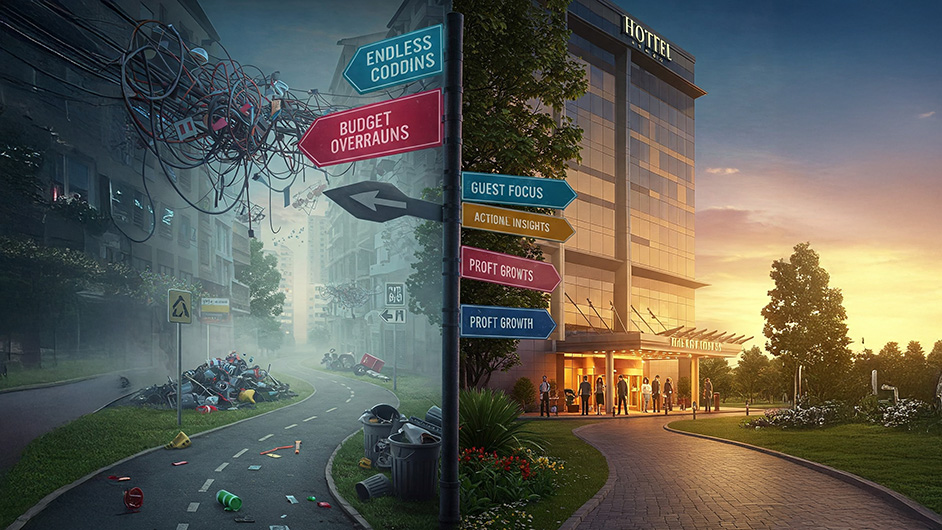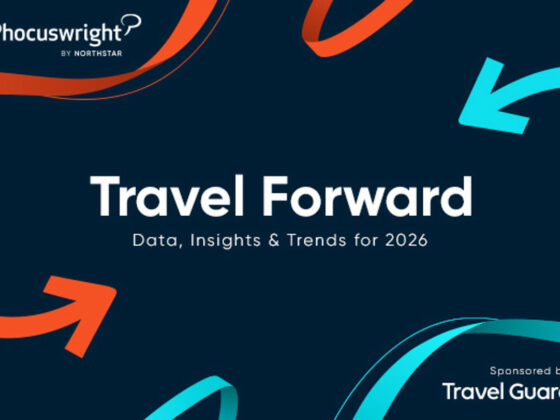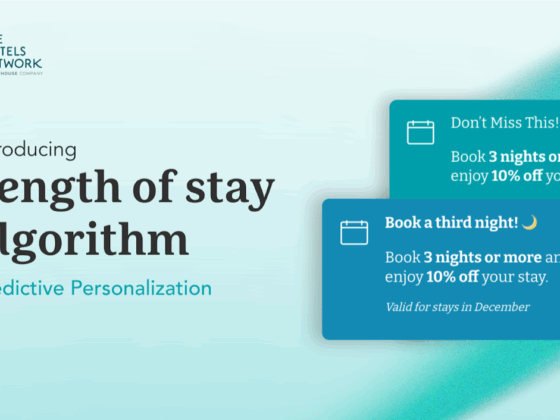
Hoteliers constantly grapple with valuable data trapped in separate silos – PMS, POS, CRS, marketing platforms – hindering the unified view crucial for strategic decisions. The natural ambition is to break down these walls for a holistic perspective. However, instead of seeking specialized hotel BI tools designed for this challenge, the instinctive reaction for many is, “We must build it ourselves.” This path typically involves ambitious plans to leverage standard technologies: architecting custom data warehouses, attempting complex integrations between disparate systems, and visualizing it all with generic BI tools like Power BI or Tableau, assuming this standard tech stack is the only way to achieve the dream.
Many hotels believe the “build-it-yourself” approach using standard, non-industry-specific tech is ideal. However, it often turns into a costly nightmare. Ambitious projects frequently spiral into chaos. Integrating diverse hotel systems with unique data structures is more complex than expected; requirements change, internal expertise is limited, and costs escalate quickly. Teams often spend significant time and resources without gaining actionable insights from unified hotel data. A key mistake is starting risky internal projects when effective hotel-specific solutions already exist. A more innovative approach is to adopt industry-specific technology designed to address hotel data challenges from the beginning.
The Harsh Realities of Building Your Own (or Living in Generic BI Land)
While a perfectly tailored internal system or a flexible setup crafted in Power BI or Tableau sounds appealing, the practical realities paint a far less rosy picture. The journey of building and maintaining your own hotel tech stack, or heavily customizing generic tools for specific hotel needs, is fraught with challenges that often undermine the very goals you set out to achieve.
Distraction from Your Core Business
Fundamentally, hotels excel at hospitality, not software engineering. Embarking on major internal tech builds or complex BI configurations inevitably diverts significant resources – time, money, and focus – away from enhancing the guest experience and driving commercial growth. Critically, it misallocates your valuable talent. Highly skilled Revenue Managers or Analysts end up acting as data engineers, wrestling with technical issues instead of focusing on strategic initiatives that generate revenue and profit. This internal focus on building and fixing tech fundamentally pulls your organization away from its core mission.
The Never-Ending Cycle of Development, Maintenance & Security
Custom-built solutions, or intricate setups in generic tools, are often inherently fragile and difficult to maintain. They can rely heavily on the individuals who created them, making staff turnover a significant risk. Furthermore, the tech landscape constantly shifts – APIs break, data formats change, and integrations fail. This creates a perpetual maintenance burden, inevitably leading to that system built years ago quickly becoming outdated, unable to keep pace with market evolution, or incorporate new capabilities. These difficulties in keeping up with evolving, industry-specific systems turn what should be a competitive edge into a burden, allowing your competition to gain an advantage.
Compounding these issues are the complex challenges of security and compliance (like GDPR, PCI DSS), which are frequently afterthoughts in custom builds, difficult to retrofit, and leave the hotel dangerously exposed. It’s a resource-intensive and risky cycle inherent to custom builds.
The True (and Staggering) Total Cost of Ownership (TCO)
The common assumption that building your own solution is cheaper is the most dangerous illusion. The initial build cost is merely the starting point. The true Total Cost of Ownership includes ongoing maintenance, bug fixes, essential updates, infrastructure costs, the internal staff time consumed (as mentioned above), and the eventual necessity of major overhauls or complete rebuilds. Unlike technology vendors who spread their substantial R&D and maintenance costs across thousands of clients, a hotel or a small hotel group (less than 200 hotels) building its own system bears this significant financial burden alone. Accounting for all direct and indirect costs over the system’s lifespan, a DIY or heavily customized generic BI solution tailored for complex hotel needs often costs many times more than investing in a mature, specialized, industry-specific platform.
These core realities – the distraction from hospitality, the relentless demands of upkeep and security, and the staggering long-term costs – demonstrate why the DIY path typically leads to strategic setbacks rather than sustainable success.
The Power BI / Tableau Limitation: Powerful Tools, Wrong Job
Let’s be clear: tools like Microsoft Power BI and Tableau are compelling platforms. They offer fantastic data visualization and analysis flexibility, and they’ve become staples in the business intelligence world across countless industries for good reason. Their ability to connect to various data sources and create compelling dashboards is undeniable.
However, their strength as general-purpose tools is precisely their weakness when applied to the intricate core logic of hotel operations. They are fundamentally hotel-agnostic. They possess no built-in understanding of the unique calculations, data relationships, complex hierarchies, and specific metrics that drive hotel revenue management, profitability, and operational analysis. Trying to force these generic tools to perform highly specialized hotel analysis is like asking a Formula 1 car to navigate a complex off-road course – it might move. Still, it’s not designed for the terrain and will likely struggle.
This lack of hotel-native DNA becomes painfully apparent when you attempt to tackle essential, everyday hotel analytics. Consider the inherent complexities that generic tools struggle with out of the box:
- Interpreting intricate rate code logic and hierarchies across different source systems and channels.
- Performing accurate market segmentation mapping that aligns with industry standards and your specific business rules.
- Calculating accurate net revenue figures involves more than simply subtracting standard commissions from gross revenue.
- Handling sophisticated package allocation logic, correctly distributing revenue between rooms, and ancillary components.
- Processing and reconciling financial transactions according to specific hotel accounting practices.
- Reliably reconstructing historical booking pace and pickup, accurately accounting for cancellations, modifications, and booking curves.
- Tracking the distinct stages and nuances of the group sales funnel.
The proposed workaround is often to hire external consultants to custom-build this complex hotel logic within Power BI or Tableau. The problem? While these consultants might be wizards with the BI tool, they rarely possess the deep, hands-on hospitality operations fluency required. They may not intuitively grasp the nuances of your specific rate strategies, channel management data intricacies, or the precise definitions needed for accurate pace reporting. Good luck getting all that complex logic built correctly, robustly, and efficiently from the ground up – you’re essentially paying a premium to reinvent a complex wheel, often imperfectly and with ongoing maintenance needs.
Therefore, while Power BI and Tableau can certainly be valuable for supplementary analysis or visualizing data after it has been adequately processed and structured by a hotel-native system, relying on them as the primary engine for your core, complex hotel analytics forces you down a path of high customization, significant risk of logical errors, and ultimately, a shallower, less reliable understanding than what truly purpose-built, hotel-native solutions provide from the start.
The AI Conundrum: Garbage In, Garbage Out
Artificial Intelligence (AI) and Machine Learning (ML) are dominating technology conversations, and rightfully so. The potential for more intelligent forecasting, dynamic pricing, enhanced guest personalization, and optimized operations in the hotel industry is immense. Understandably, everyone wants to leverage these powerful capabilities to gain a competitive advantage.
However, a fundamental prerequisite often gets overlooked in the rush towards AI adoption: the effectiveness of any AI or ML model depends entirely on the quality, structure, and contextual accuracy of the underlying data it’s trained on. Sophisticated algorithms are only as good as the information they consume. It boils down to the timeless computer science principle: “Garbage In, Garbage Out” (GIGO).
Building your own tech stack or relying on generic BI tools often creates barriers to effective AI implementation. These methods typically produce flawed, incomplete, or non-standardized data models that miss the critical nuances of hotel-specific logic, such as rate structures, net revenue calculations, and segmentation. Applying AI or ML models will likely fail without a solid foundation, leading to poor business decisions.
Therefore, instead of investing precious resources attempting to build custom BI platforms on potentially shaky foundations, a much more strategic priority for hotels should be improving the quality and consistency of data within their core operating systems. Many hotels grapple with poor data quality – inconsistent entries, incomplete records, and a lack of standardized PMS, POS, or CRS formats. Tackling these foundational issues head-on yields far greater long-term value. Clean, reliable, standardized source data is the essential prerequisite for any advanced analytics or AI initiative to succeed, and it significantly enhances the power and reliability of industry-specific business intelligence tools designed to leverage such data effectively. Investing in data quality is a smarter path to becoming AI-ready than building your potentially flawed BI system.
The Strategic Advantage: Buying Purpose-Built, Industry-Specific Solutions
Having explored the significant pitfalls of the DIY route and the limitations of generic BI tools, the strategic alternative becomes clear: investing in purpose-built, industry-specific technology solutions. This approach effectively aligns resources, mitigates risks, and ultimately delivers superior results by leveraging specialized expertise.
- Industry Expertise Baked In & Complexity Handled Correctly: Unlike generic platforms, specialized hotel solutions are designed from the ground up by hotel experts for hotel professionals. This deep, built-in hotel DNA ensures data integrity and analytical relevance right out of the box.
- Faster Time-to-Value & Continuous Innovation: Instead of enduring a lengthy, expensive, risky internal build process with uncertain outcomes, implementing a specialized solution delivers actionable insights much faster. Furthermore, dedicated vendors continuously invest in research and development, refining their platforms, adding new features (including relevant, well-integrated AI capabilities), and adapting to market changes.
- Demand Calendar: The Preferred Choice for Accessible, Deep Insight: Among several specialized options, Demand Calendar stands out as an industry-preferred solution that embodies these principles. It simplifies complex hotel-native logic and delivers highly intuitive insights, making crucial commercial data easily accessible to specialists and team members across all departments – including Revenue Management, Sales, Marketing, Operations, and General Management. By democratizing data, Demand Calendar enables various hotel roles to understand performance drivers and make informed decisions, directly improving results hotel-wide or within their specific areas of responsibility. Demand Calendar transforms complex hotel data into a clear, actionable format, ensuring optimal decision-making.
Choosing a powerful, intuitive, industry-specific solution like Demand Calendar is a strategic investment in embedded expertise, rapid insights, continuous improvement, and broad team enablement for significantly better performance across the hotel.
Adaptability: The Winning Mindset
The pursuit of ‘total control’ often drives hotels towards custom tech builds, seeking a perfect fit for every unique process. However, this overlooks a more pragmatic path. The winning mindset recognizes it’s far more strategic to adapt processes slightly to align with a powerful, best-practice industry solution than to build a fragile, custom system from scratch – a system that inevitably requires constant fixing and consumes valuable resources.
Crucially, despite vast differences in concept, brand, architecture, decor, and people, hotels worldwide fundamentally rely on the same core KPIs and commercial insights to drive performance. A robust, hotel-specific solution is built around these universal requirements and typically covers 95% or more of what’s truly needed for effective decision-making across revenue, sales, marketing, and operations.
Conclusion: Invest in Hospitality, Partner for Technology
Building a custom hotel tech solution or using generic BI tools like Power BI or Tableau is tempting. They promise control and unique insights. But this path is risky. It always results in higher long-term costs, fragile systems that are hard and costly to maintain, quick tech obsolescence, and a distraction from your primary focus: hospitality. It can also lead to flawed data models that give unreliable insights and block effective AI use.
In stark contrast, investing in specialized, industry-native solutions offers a clear and compelling strategic advantage. You immediately leverage deep, embedded hospitality expertise, ensuring complex calculations and industry logic are handled correctly from day one. This translates to faster time-to-value, enhanced reliability, and access to continuous innovation driven by dedicated vendor R&D (including relevant AI advancements). Most importantly, it allows your team to maintain focus on guests and commercial strategy, armed with accurate, actionable insights derived from robust data models, delivering superior long-term value and often a lower total cost of ownership.
So, now is the time to consider your current technology approach. Take a hard look at ongoing or planned DIY development projects or extensive customizations of generic BI tools—are they truly delivering strategic value, or are they consuming disproportionate resources and focus?
We urge you to prioritize investing your most valuable assets – your capital, your time, and your team’s talent – where they matter most: enhancing the guest experience and driving profitable commercial growth. Let dedicated hotel technology providers, experts specializing in solving these complex data challenges, provide the necessary tools. Partner with solutions like Demand Calendar that understand your business intrinsically.







